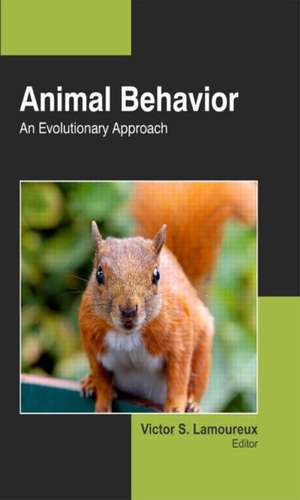Animal Behavior: An Evolutionary Approach
Editat de Victor S. Lamoureuxen Limba Engleză Hardback – 15 apr 2011
This book looks at a range of topics covering a variety of animals, including how macaques teach their offspring, how rats transmit avoidance behavior, how supplementary feeding of tree frogs affects their breeding behavior, and more. Studies in animal behavior can have far-reaching implications for animals and humans alike, such as how humans can improve conservation efforts, how to better protect animals—both in the wild and in captivity (zoos), and what can be learned about humans from animals, such as how the human brain and behaviors might work.
| Toate formatele și edițiile | Preț | Express |
|---|---|---|
| Paperback (1) | 578.28 lei 3-5 săpt. | +20.63 lei 10-14 zile |
| Apple Academic Press Inc. – 31 mar 2021 | 578.28 lei 3-5 săpt. | +20.63 lei 10-14 zile |
| Hardback (1) | 769.55 lei 6-8 săpt. | |
| Apple Academic Press Inc. – 15 apr 2011 | 769.55 lei 6-8 săpt. |
Preț: 769.55 lei
Preț vechi: 1030.54 lei
-25% Nou
Puncte Express: 1154
Preț estimativ în valută:
147.25€ • 154.16$ • 121.84£
147.25€ • 154.16$ • 121.84£
Carte tipărită la comandă
Livrare economică 05-19 aprilie
Preluare comenzi: 021 569.72.76
Specificații
ISBN-13: 9781926692784
ISBN-10: 1926692780
Pagini: 320
Ilustrații: Illustrations, maps
Dimensiuni: 178 x 254 x 23 mm
Greutate: 0.75 kg
Ediția:1
Editura: Apple Academic Press Inc.
Colecția Apple Academic Press
ISBN-10: 1926692780
Pagini: 320
Ilustrații: Illustrations, maps
Dimensiuni: 178 x 254 x 23 mm
Greutate: 0.75 kg
Ediția:1
Editura: Apple Academic Press Inc.
Colecția Apple Academic Press
Public țintă
Academic and PostgraduateCuprins
Free-Ranging Macaque Mothers Exaggerate Tool-Using Behavior when Observed by Offspring. Mouse Cognition-Related Behavior in the Open-Field: Emergence of Places of Attraction. Altered Behavior and Digestive Outcomes in Adult Male Rats Primed with Minimal Colon Pain as Neonates. Social Transmission of Avoidance Behavior under Situational Change in Learned and Unlearned Rats. Molecular Variation at a Candidate Gene Implicated in the Regulation of Fire Ant Social Behavior. Ultrasonic Communication in Rats: Can Playback of 50-kHz Calls Induce Approach Behavior? Supplementary Feeding Affects the Breeding Behavior of Male European Treefrogs (Hyla arborea). Mirror-Induced Behavior in the Magpie (Pica pica): Evidnce of Self-Recognition. Precocious Locomotor Behavior Begins in the Egg: Development of Leg Muscle Patterns for Stepping in the Chick. Perinatal Androgens and Adult Behavior Vary with Nestling Social System in Siblicidal Boobies. Transcriptomic Profiling of Central Nervous System Regions in Three Species of Honey Bee during Dance Communication Behavior. Plant Volatiles, Rather than Light, Determine the Nocturnal Behavior of a Caterpillar. Risk and Ethical Concerns of Hunting Male Elephant: Behavioral and Physiological Assays of the Remaining Elephants. Home Range Utilisation and Territorial Behavior of Lions (Panthera leo) on Karongwe Game Reserve, South Africa. Introduced Mammalian Predators Induce Behavioral Changes in Parental Care in an Endemic New Zealand Bird. Index.
Notă biografică
Professor Victor S. Lamoureux received his master’s degree in teaching biology and his PhD in biology from Binghamton University, the State University of New York, Binghamton, New York, USA. He is also an Adjunct Professor of Biology at Broome Community College in Binghamton, New York, USA. His research studies involve the ecology and overwintering behavior of the green frog, Rana clamitans.
Descriere
This title includes a number of Open Access chapters.
This comprehensive volume looks at a range of topics covering the habits of a variety of animals, including how macaques teach their offspring, how rats transmit avoidance behavior, how supplementary feeding of tree frogs affects their breeding behavior, and more. Studies in animal behavior can have far-reaching implications for animals and humans alike—suggesting how humans can improve conservation efforts, how we can better protect animals both in the wild and in captivity, and what can be learned about humans from animals.
This comprehensive volume looks at a range of topics covering the habits of a variety of animals, including how macaques teach their offspring, how rats transmit avoidance behavior, how supplementary feeding of tree frogs affects their breeding behavior, and more. Studies in animal behavior can have far-reaching implications for animals and humans alike—suggesting how humans can improve conservation efforts, how we can better protect animals both in the wild and in captivity, and what can be learned about humans from animals.












